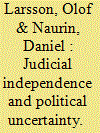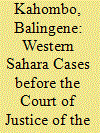| Srl | Item |
| 1 |
ID:
147083


|
|
|
|
|
| Summary/Abstract |
There is broad agreement in the literature that international courts (ICs) make decisions with bounded discretion in relation to state governments. However, the scope of this discretion, and the determinants of its boundaries, are highly contested. In particular, the central mechanism in separation-of-powers models of judicial politics—the possibility of legislative override—has raised controversy. We argue that the uncertainty that judges face regarding the political reactions to their decisions has important and undertheorized implications for their behavior. On the one hand, cautious judges are likely to be attentive to signals that contain information about the probability of an unfavorable override. On the other hand, misjudgments of the political risks are likely to be made. Thus, the possibility of override is a significant factor affecting judicial behavior, but it is also a fairly blunt mechanism for balancing the independence and accountability of courts. The empirical study focuses on the Court of Justice of the European Union (CJEU), which has long been at the center of theory development regarding the legalization of world politics and the rise of international courts. The results demonstrate a strong correlation between the CJEU's rulings and the political signals it receives, in a pattern that goes beyond legal merit, and that fits with the override mechanism. State governments are crucial parts of the broader audience that defines the political boundaries of judicial discretion.
|
|
|
|
|
|
|
|
|
|
|
|
|
|
|
|
| 2 |
ID:
170423


|
|
|
|
|
| Summary/Abstract |
This paper reviews the relevance of the Western Sahara cases brought before the Court of Justice of the European Union to international law. These cases relate to the contestations of the consistency of a number of economic agreements concluded between the European Union (EU) and the Kingdom of Morocco, as well as the EU acts that approved them, with the Treaty on the European Union (TEU) and the Treaty on the Functioning of the European Union (TFEU). The issues arising from these disputes include the legality of the Court’s jurisdiction to review the validity of a treaty which is already in force between parties and the rules of international law that the contested legal instruments have violated, perhaps entailing their invalidity under EU law. While the Court has rightly found that none of the aforementioned agreements is applicable to Western Sahara—since their territorial scope does not extend to a territory which is not subject to Moroccan sovereignty——this paper tries to answer a different question as to whether the Court’s decisions are in line with international law. It is demonstrated that though the Court’s competence to rule on the validity of EU unilateral acts is obvious, the establishment of its power to review the validity of a treaty which is in force, such as the fisheries agreement of 2006, is dubious because of the inconsistency of such power with the Vienna Convention on the Law of Treaties. In any event, the question which remains to be solved—and which was not submitted to the Court—pertains to the determination of the effects of the illegal application of the EU-Morocco agreements to Western Sahara on the rights of its people. It is concluded that such an application has violated the law of occupation and eventually international human rights law. These violations do not touch upon the validity of the contested legal instruments but relate to the question of responsibility for a wrongful act stemming from the illegal application of those agreements to occupied Western Sahara in a manner which is harmful to the interest of its people.
|
|
|
|
|
|
|
|
|
|
|
|
|
|
|
|